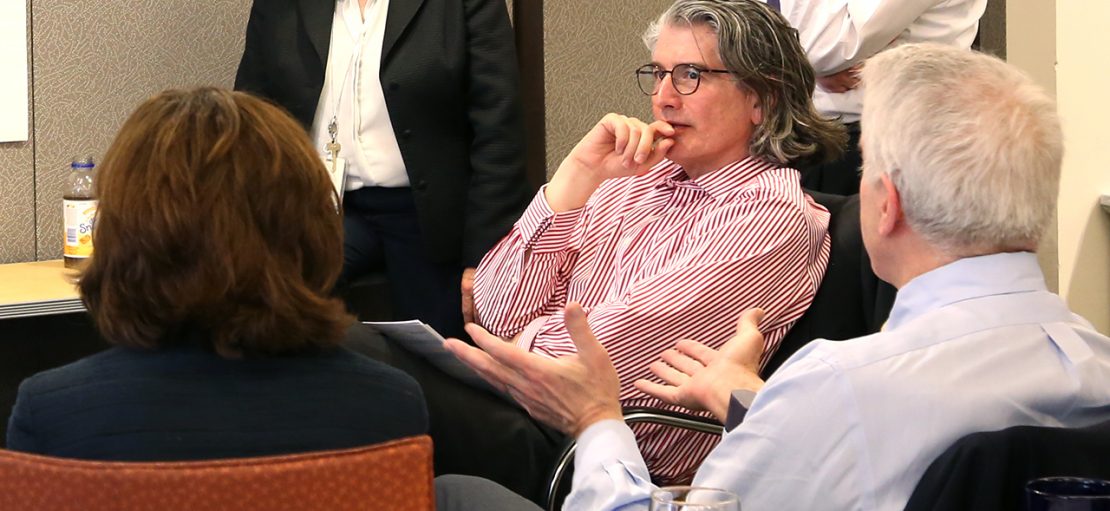Summary Report: Fall 2019 Geriatric Medicine Board Meeting
September 23, 2019 | Posted by ABIM | ABIM Governance, MOC, News
Like our fellow ABIM Specialty Boards, the Geriatric Medicine Board is responsible for the broad definition of our specialty across Certification and Maintenance of Certification (MOC). Specialty Boards have oversight of the Exam Committees and are responsible for making Certification and MOC relevant to their disciplines.
At this meeting, we discussed a number of key issues for ABIM and the geriatric medicine community, and received important updates from ABIM leadership. The following is a recap of the discussions and action items.
The Future of Assessment
Richard Baron, MD, ABIM President and CEO, welcomed the Geriatric Medicine Board and provided an update on the announcement of the longitudinal assessment pathway, and reactions of society partners and diplomates. He also described ongoing planning activities related to development of this new pathway as well as potential impacts of the decision to offer a longitudinal assessment option.
- Following Dr. Baron’s update and presentations from other ABIM staff on the proposed longitudinal assessment option, the Geriatric Medicine Board shared initial feedback on the direction and discussed how it would work for geriatricians. The group expressed optimism about the future of MOC and appreciation to be part of an organization that listens to diplomate feedback and is committed to making continual improvements to its programs.
- Additional information on the development of the longitudinal assessment option and a timeline for its development will be coming later this fall.
- ABIM wants to hear from diplomates, geriatricians and society partners to help inform the direction of this assessment option. You can share your comments here.
Trends in Geriatric Medicine Certification
Building on previous Geriatric Medicine Board meetings, discussions continued about why physicians who certify in geriatric medicine might choose not to maintain it over time, particularly for those who certify in other ABIM subspecialties. Staff have been conducting surveys and interviews with physicians who have trained in geriatric medicine and other subspecialties to learn more about their current practice and why they chose to initially train in geriatric medicine. Board members also requested that staff report back on physicians who train in geriatric medicine but have not yet initially certified in the discipline. The Geriatric Medicine Board will continue to discuss these issues at the spring 2020 meeting, with additional data to be provided by staff.
Diplomate Professional Profiles
The Diplomate Professional Profile is currently being updated to include specialty-specific questions. Once it is finalized, diplomates will be asked to complete a periodic survey about the characteristics of their professional activity so that ABIM can assure relevancy of exam questions based on what physicians see in practice. Members reviewed the questions that all diplomates answer on the survey, regardless of specialty. In addition, they reviewed and offered refinements to the geriatric-specific questions that all diplomates maintaining certification in geriatric medicine will be asked to answer.
Forging Mid-Career Pathways for Geriatric Medicine
The Geriatric Medicine Board considered its progress in exploring with the Association of Directors of Geriatric Academic Programs (ADGAP) and the American Geriatrics Society (AGS) whether there is a demand to create mid-career training pathways to enter geriatric medicine. ADGAP is committed to advancing academic geriatrics programs and supporting academic geriatrics program directors to benefit and aid patient care, research, and teaching programs in geriatric medicine within accredited medical schools located in the United States. Dr. Leff plans to connect with AGS and ADGAP leadership to gain their input on the subject of mid-career training pathways.
Procedural Competencies
The Geriatric Medicine Board held an in-depth discussion of procedural competencies internal medicine residents should be expected to have in order to transition successfully to geriatric medicine fellowship, i.e. pre-fellowship procedures. The concept of “pre-fellowship procedures” came out of the Internal Medicine Board’s decision not to use a common set of procedural competencies across all graduating internal medicine residents. The requirement states that all residents must do some procedures, and Program Directors must make opportunities available that will allow residents to become competent in practice-specific procedures needed for their next level of training. Geriatric Medicine Board members identified AGS, ADGAP, fellowship directors and recent fellows as key stakeholders in identifying any “pre-fellowship” procedures for geriatric medicine when this is explored in the future.
In Closing
The Geriatric Medicine Board welcomes feedback and commentary from diplomates, society partners and the greater medical community. We hope you find this report to be valuable and informative.
Do you have any questions? Are you interested in how to get involved?
If you have questions after reading this report, please connect with us through the following channels:
- Subscribe to blog.abim.org for regular updates
- Call:1-800-441-ABIM (2246)
- Email: request@abim.org
- Join our Governance to help guide our future direction
- Join our Community Insights Network to share your feedback.




